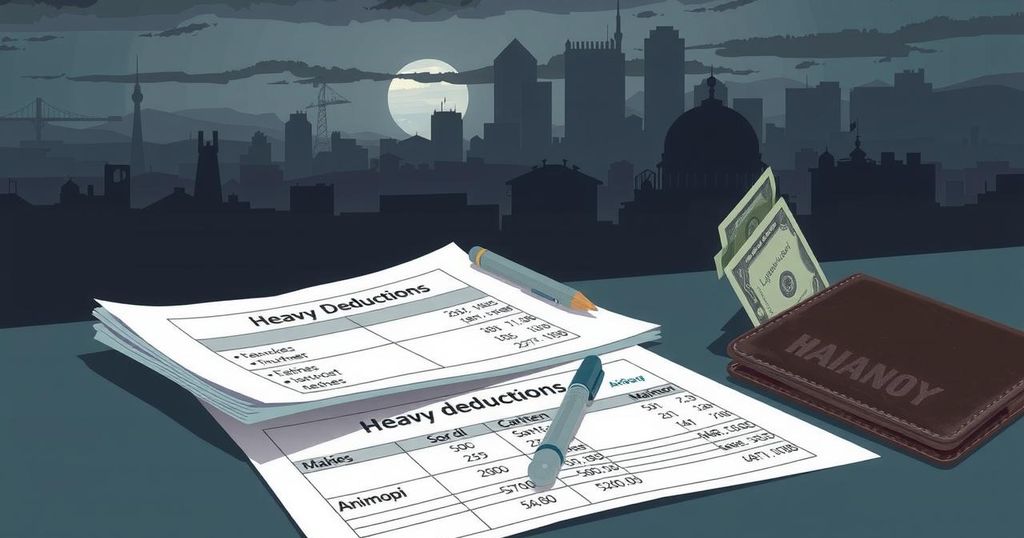Kenyans Face Burgeoning Tax Burden Amid Rising Costs and Public Outcry

Kenyans face rising payroll taxes and increased costs of living due to government measures aimed at raising revenue amidst mounting national debt. Public frustration grows over the impacts of these tax hikes on low-income families, as many question the effectiveness of government accountability and delivery of essential services.
In Kenya, recent pay stubs reveal significant deductions from salaries, aimed at funding affordable housing and health insurance. Employees earning a monthly salary of 45,000 shillings (about RM1,474) are witnessing their take-home pay shrink by 9%. According to Kennedy Odede, a community organizer based in Nairobi’s Kibera slum, many salaried workers are deeply frustrated by these changes.
Under the administration of President William Ruto, payroll tax hikes are part of attempts to increase government revenue amid escalating foreign debt. New excise taxes have been introduced on sugar, alcohol, and plastics, and the tax on business profits has doubled to 3%. Meanwhile, government fees for money transfers and data services have seen substantial increases ranging from 15% to 20%, with an import tax on essential goods rising to 2% from 1.5%.
Tax increases are rarely received well, but for countries like Kenya, where many citizens live on low incomes and the burden of debt is immense, the sting is sharper. Years of aggressive borrowing combined with economic shocks, such as from the COVID-19 pandemic, have pushed Kenya’s debt to a staggering US$80 billion. As a result, nearly 60% of the nation’s revenue is allocated to servicing these loans, a situation echoed throughout many African nations.
Addressing financial challenges is critical for long-term development. Yet there is a worryingly small tax base in Kenya, where about 40% of the 52 million residents live in poverty and an alarming youth unemployment rate exceeds 25%. With 83% of the workforce engaged in informal jobs, the tax burden largely falls onto those with formal salaries.
Elizabeth Okumu, who works with Shining Hope for Communities, highlights the decreased purchasing power caused by these tax hikes. The rising cost of importing goods has worsened the situation, pushing down the value of the Kenyan shilling against the US dollar. Indeed, what used to buy cooking oil, flour, rice, and sugar for 1,000 shillings can now buy only sugar and flour.
Previous tax increase proposals led to violent protests in Nairobi last year, resulting in over 50 deaths. Although the government temporarily retreated on some of the tax increases, many were quickly reinstated. Currently, discussions with the International Monetary Fund regarding a new loan package hint at demands for the government to reign in spending and enhance revenue collection.
Citizens are increasingly cynical about the government’s handling of debt and its ability to provide basic services. Auditor-General Nancy Gathungu’s reports raise alarms about corruption, including unaccounted funds exceeding US$1.24 billion meant for debt servicing and US$64 million in unaccounted COVID vaccine funds. Public discontent is palpable, particularly among the youth, highlighted by comments from Tatiana Gicheru, a student at Strathmore University, who expressed skepticism towards government accountability.
As anti-tax sentiments rise, young professionals like Jewel Ndung’u are left wondering about the absence of much-needed services such as affordable housing and health care. After 73 job applications yielded no offers, she expressed a desire for a direct mechanism for Kenyans to manage their debt instead of relying on government distribution of taxes.
Taxation in Kenya was at 16.6% of the country’s total output in 2022, which is relatively standard for Africa but still significantly lower than rates in developed nations. With the anniversary of the riots approaching, concerns over additional tax increases in the upcoming government budget are fuelling fears of renewed unrest. As Okumu poignantly states, hard work is not yielding results: people’s hopes fade into darkness as they face unrelenting challenges tomorrow after tomorrow.
The tax burdens that Kenyans now shoulder reflect a complex interplay of rising costs and economic challenges, exacerbated by reliance on borrowing and increasing scrutiny over government mismanagement. Public sentiment is leaning towards frustration and distrust as essential services remain lacking while debts rise. With the potential for further financial strain looming on the horizon, many worry that the volatile situation could ignite renewed protests, echoing last year’s tragic unrest. Kenyans are fervently seeking accountability and tangible improvements in their daily lives amidst soaring living expenses.
Original Source: www.thestar.com.my








